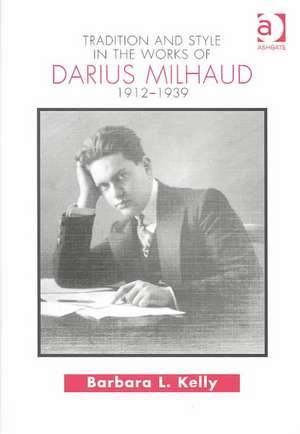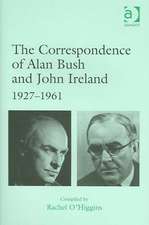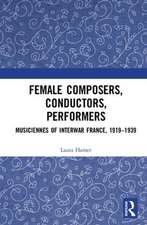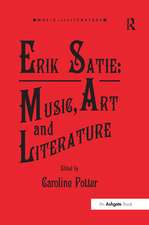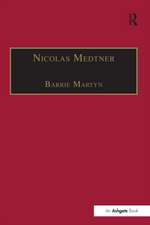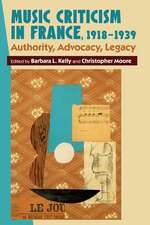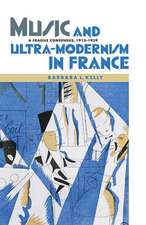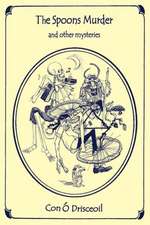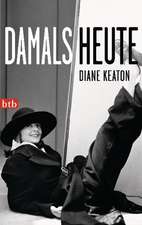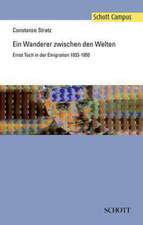Tradition and Style in the Works of Darius Milhaud 1912-1939
Autor Barbara L. Kellyen Limba Engleză Hardback – 21 mai 2003
| Toate formatele și edițiile | Preț | Express |
|---|---|---|
| Paperback (1) | 338.33 lei 43-57 zile | |
| Taylor & Francis – 6 mar 2017 | 338.33 lei 43-57 zile | |
| Hardback (1) | 764.20 lei 43-57 zile | |
| Taylor & Francis – 21 mai 2003 | 764.20 lei 43-57 zile |
Preț: 764.20 lei
Preț vechi: 1102.79 lei
-31% Nou
Puncte Express: 1146
Preț estimativ în valută:
146.28€ • 158.94$ • 122.95£
146.28€ • 158.94$ • 122.95£
Carte tipărită la comandă
Livrare economică 21 aprilie-05 mai
Preluare comenzi: 021 569.72.76
Specificații
ISBN-13: 9780754630333
ISBN-10: 0754630331
Pagini: 228
Dimensiuni: 169 x 244 x 23 mm
Greutate: 0.45 kg
Ediția:1
Editura: Taylor & Francis
Colecția Routledge
Locul publicării:Oxford, United Kingdom
ISBN-10: 0754630331
Pagini: 228
Dimensiuni: 169 x 244 x 23 mm
Greutate: 0.45 kg
Ediția:1
Editura: Taylor & Francis
Colecția Routledge
Locul publicării:Oxford, United Kingdom
Cuprins
Contents: Preface; Milhaud, Les Six and musical politics in Paris; Milhaud's writings on tradition and identity; Works for music theatre 1: collaboration with Paul Claudel; Works for music theatre 2: the chamber operas; Vocal music: texts and voices; Polytonality, counterpoint and instrumentation; Milhaud and the past; Conclusions: Milhaud's musical achievements to 1939; Bibliography; Index.
Notă biografică
Barbara Kelly is Senior Lecturer in Music at Keele University. She researches on late nineteenth and early twentieth-century French music and on issues of French national identity from 1870-1939. She is author of several articles on Milhaud, Debussy and Ravel, including the Ravel article in The New Grove Dictionary of Music and Musicians, and chapters in the Cambridge Companion to Ravel and the Cambridge Companion to Debussy. She is preparing a study of Ravel’s late works.
Recenzii
'Kelly has done her work thoroughly, and she writes with clarity and acuity... useful to all students of 20th-century music.' Choice 'Barbara Kelly's [...] volume is not only a welcome addition to new Milhaud scholarship but an impressiverly detailed study which directly sets out to challenge the conventional preconceptions associated with the composer, including his involvement with Les Six... Kelly's study represents an impressive reassessment of Milhaud's contribution to French music and should be deemed essential reading for all scholars of the period.' Frankfurter Zeitschrift für Musikwissenschaft
Descriere
Described by Maurice Ravel as one of the most considerable talents in French music of his generation, Darius Milhaud remains a largely neglected composer. This book reappraises his contribution, focusing on the emergence of the composer's style until his Jewish background forced his exile to the United States on the eve of the World War II. The period 1912-1939 spans the crucial years that mark the development of Milhaud's mature style. It was also during this time that he published his most important writings on contemporary music and its relationship to the past. Barbara Kelly discusses the extent to which Milhaud's complex views on the idea of a French national musical heritage relate to his own practice, and considers how his works reflect the balance between innovation and tradition. Drawing comparisons with contemporaries, such as Debussy, Satie, Schoenberg, Stravinsky and Poulenc, the book argues that the rhythmic vitality of Milhaud's style and his modal approach within a polytonal context mark him out as an original and distinctive composer.
